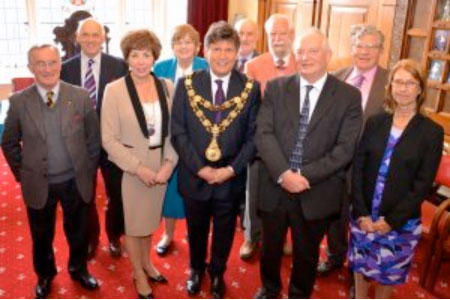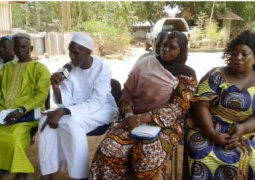
The British High Commissioner to The Gambia, David Morley, has described the relationship between Gunjur and Marlborough in the UK as a “fine example of a true partnership”.
He made these comments after a recent visit to Marlborough where he also stated that the British Government has always welcomed and supported these types of links with The Gambia, especially because they are not just one way.
This is a fine example of a true partnership and it shows how a relationship between two countries can operate at multiple levels, he said.
High Commissioner Morley said that so much can be achieved outside the usual Government to Government networks, and hopes that Marlborough and Gunjur will continue to enjoy a warm and effective relationship for many years to come.
Gambians appreciate long-term relationships and with a full partnership like MBGs, “they will deliver what they say they will” as the people of Gunjur are reliable and disciplined and MBG has the right structures in place, he said.
“As well as with MBG itself, I had some interesting and useful discussions with representatives from Afrikaya, Gamset and Abbeyfield School, all of whom do great work here,” HC Morley said.
He continued: “Jacki and I enjoyed meeting the Hon. Mayor of Marlborough Mr Guy Loosmore and his Councillors. We also visited Marlborough College and St John’s Academy and during the latter enjoyed a wonderful audio visual presentation by several St John’s students, all about their recent visit to Gunjur. They obviously had a wonderful time and enjoyed the traditionally excellent hospitality offered by their hosts. Mrs Claire Perry MP, who visited Gunjur a few months ago, was also present.”
Speaking at a reception for the High Commissioner Morley, the mayor of Marlborough Guy Loosmore declared: “We have a special relationship with The Gambia; several mayors have been. It’s a good example of a two-way flow. We need to look at other cultures and how they do things. If the world worked like that, we’d all get on much better.”
Dr Nick Maurice, a co-founder of Gunjur Marlborough link, explained: “The visit of the High Commissioner David Morley and his wife Jacki was highly significant for us for a number of reasons. It was the first time we had had an official visit from a High Commissioner currently in post. It certainly helped to raise the profile of MBG and its work. It provided us with an opportunity to briefly discuss with him the history of the Marlborough Brandt Group and impress on him that our relationship with the people of Gunjur, which has to date involved the exchange of some 1500 people, has been about mutual learning and about personal, professional and community development at both ends.”
Dr Maurice added: “So often aid agencies (and I don’t like the word aid as it suggests helping people who are unable to do things for themselves) are seen as a one way stream from the so-called rich to the so-called poor. I often wonder whether the benefits to those many people from Marlborough who have lived and worked in Gunjur over the years haven’t been considerably greater than the benefits that have accrued to the people of Gunjur. I include myself in that question.”
The exchange visit between the two communities which has gone a long way in enhancing cultural understanding, has been compromised by the inability of young people of Gunjur to visit them in the UK due to difficulties with securing visas for them, Nick Maurice said.
“The mutuality and reciprocity of our relationship is currently under threat as the UK Borders Agency has made it so much more difficult to get visas for incomers, not just from The Gambia but from almost anywhere outside the EU.
“We discussed this with David Morley and it is clear that we are going to have to accept the new situation and adapt to it.
“We shall be having discussion with colleagues in Gunjur and will be looking at whether we can bring older professional people over who are not seen as a risk for disappearing once they are in the UK and becoming illegal immigrants.”




